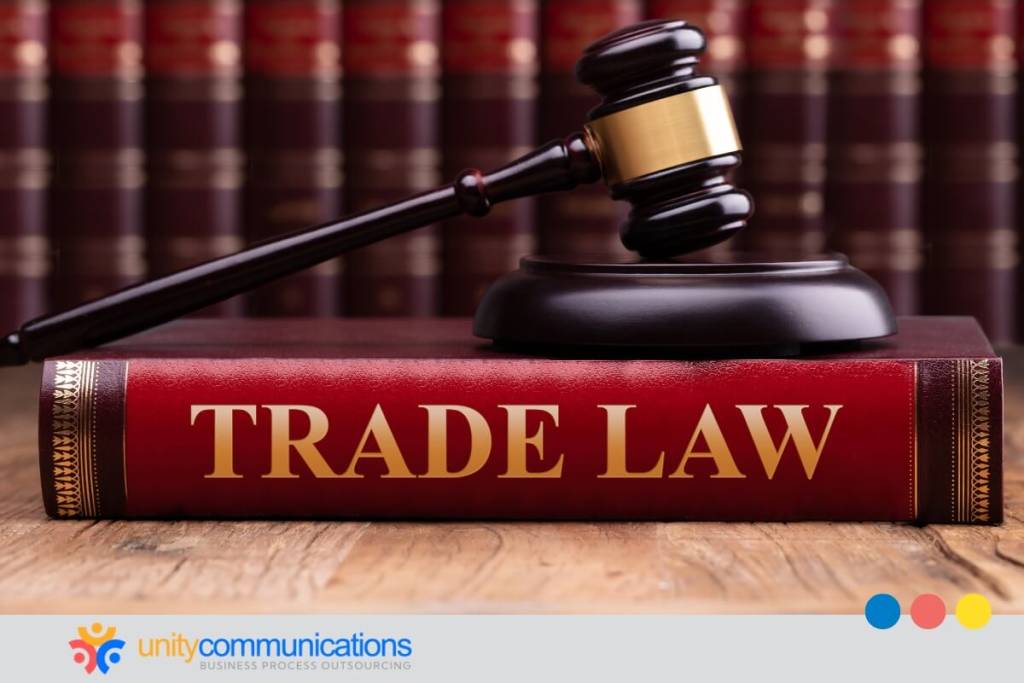Table of Contents
Companies outsource to optimize efficiency, focus on core competencies, and improve revenue. With the popularity of nearshoring and offshoring, this business practice is increasingly global and thus requires the guidance of trade laws.
These rules impact how accessible or challenging it is to outsource to providers in a different state or foreign country. Tariffs, levies, labor rules, and intellectual property (IP) protection are essential considerations in business process outsourcing (BPO).
This article explores how different trade laws impact outsourcing practices. Keep reading to discover how these regulations shape the landscape of global business collaboration.
Definition of Outsourcing and Brief Overview of Trade Laws

What is BPO, and how is it related to trade laws? This approach delegates specific tasks or processes to service providers, often located in other regions. Nearshore and offshore BPO companies offer various outsourcing services, such as customer support, helpdesk, information technology (IT) assistance, human resources (HR), logistics, and data entry.
Conversely, trade laws are a challenging regulatory structure that directs the cross-border interchange of products and services. They encompass the rules, tariffs, and agreements governing business relations among nations.
Before businesses can leverage outsourcing for more efficiency, cost-effectiveness, and market opportunities, they must comprehend complex trade laws. The regulatory framework can influence the ease or difficulty of outsourcing activities, making it crucial for BPO providers and client companies.
Trade Laws That Can Influence Outsourcing Activities

Trade laws can have an impact on outsourcing and related activities. Various countries’ complex regulatory environments impact the crucial trade-related factors listed below. These factors are necessary to understand the effects of outsourcing:
Import and Export Regulations
Countries have specific regulations governing the import and export of products and services. This trade law can influence outsourcing in the following ways:
- Customs clearance procedures. Import/export rules impact customs clearance in outsourcing, which is crucial for timely operations and seamless processes. An example of outsourced goods passing through customs clearance is electronic components manufactured in one country, then shipped for assembly elsewhere.
- Documentary requirements. Outsourcing involves cross-border movement, and trade laws mandate thorough documentation. Examples are commercial invoices detailing the transaction’s retail value and packing lists that enumerate each shipment package’s contents.
- Restricted and prohibited goods. Import/export rules outline specified goods. Examples are hazardous materials, such as chemicals, biological agents, and other similar substances used in outsourced manufacturing or production processes.
- Sanction-related trade risk. A breach of import/export rules might result in sanctions, which could affect the reputation and operations of outsourcing companies.
Tariffs and Customs Duties
Tariffs and customs duties are taxes imposed on imported and exported goods. Here are a few ways tariffs affect outsourcing:
- Cost-related implications. Tariffs and customs duties impact outsourcing costs. Import and destination tariff rates raise overall expenses, affecting the financial feasibility of outsourcing arrangements.
- Competitive positioning. Tariffs affect competitiveness. Higher tariffs may deter outsourcing to specific regions. High local tariffs can also urge companies to seek global and more cost-effective outsourcing solutions, influencing their day-to-day operations.
- Supply chain optimization. Tariffs and customs duties determine the movement of goods in the supply chain. Companies engaged in outsourcing must consider this factor to minimize additional costs.
Free Trade Agreements (FTAs)
FTAs establish preferential trade terms between participating countries, reducing or eliminating specific trade barriers. Consider how the provisions of this law might affect outsourcing and related processes.
- Reduced trade barriers. FTAs aim to minimize obstacles, including tariffs and quotas. Easing the cross-border movement of goods and services boosts outsourcing efficiency.
- Accessible market opportunities. FTAs offer an expanded market entry for outsourcing. Companies gain increased market opportunities, broadening the scope and potential of outsourcing activities.
- Standardized regulations. FTAs simplify trade policies and make it easier for outsourcing companies to comply with regulations. They provide a consistent regulatory framework that applies across all participating countries.
- Stimulated economic growth. FTAs spur economic expansion, thus fostering a favorable business environment in participating countries and positively impacting outsourcing activities.
World Trade Organization (WTO) Rules
WTO regulations cover agreements, dispute resolution, and general principles for international trade. Discover how this trade law can modify outsourcing and associated activities:
- Nondiscriminatory principle. WTO rules, notably the most favored nation (MFN) clause, endorse trade nondiscrimination. This clause promotes fair and equal treatment among partners, impacting companies’ selection of outsourcing hubs.
- Dispute-settlement mechanism. The WTO offers a dispute-settlement system for member countries. It adds legal certainty to outsourcing relationships, particularly during cross-border disputes.
- Transparency and predictability. WTO rules enhance transparency in trade policies, benefiting outsourcing by offering more precise insights into the regulatory environment of potential destinations.
- Promotion of fair competition. WTO rules foster global fair competition, impacting the competitive dynamics of outsourcing by aligning trade practices with fair competition principles.
Intellectual Property (IP) Laws
Knowing who owns what is crucial in partnerships. Trade-related IP agreements address patents, trademarks, and copyrights over outsourced activities and goods. Look how this trade law can sway outsourcing and similar operations:
- Proprietary information protection. When outsourcing, IP laws safeguard proprietary information, trade secrets, and confidential data. They protect shared, sensitive information between the service provider and the parent company.
- Technological transfer. IP regulations impact tech transfer in outsourcing. Contracts must address IP ownership, licensing, and usage rights.
- Patent and trademark protection. BPO organizations can own patents or trademarks. IP laws offer the legal framework for obtaining and enforcing these protections.
- Collaborative research and innovation. IP laws shape outsourcing collaboration, guiding innovation and research parameters. Companies navigate regulations for joint projects and new IPs.
- Non-disclosure agreements (NDAs). NDAs are necessary to protect trade secrets in outsourcing. BPO partners are required to sign NDAs, reinforcing their confidentiality commitment.
- Technological safeguards. Encryption and access controls are vital for protecting IP and preventing unauthorized access.
Labor Laws and Standards
Labor laws can also intersect with trade regulations. They ensure protection and fair treatment for American and foreign third-party workers. Uncover how labor laws affect outsourcing activities.
- Cross-border personnel movement. Labor laws affect regulations on work visas, immigration, and employment eligibility that influence workforce deployment in outsourcing destinations.
- Employment contracts and terms. Labor laws shape contracts, requiring outsourcing activities to align with local regulations for compliance and fair employee treatment.
- Wage and benefit requirements. Labor laws establish minimum wage and benefit standards. Firms engaged in outsourcing must consider labor costs when determining compensation packages for diverse workforce locations.
- Work hours and overtime regulations. Labor laws govern work hours, overtime, and rest periods. Complying with these regulations is crucial to ensuring fair labor practices in outsourcing.
Data Protection and Privacy Laws
Data and confidentiality regulations can impact BPO activities, particularly in industries (e.g., health insurance) dealing with sensitive information. Check how this trade law can mold outsourcing and similar tasks:
- Confidentiality requirements. Data protection laws demand strict privacy. BPO firms must deploy measures to safeguard sensitive information during processing.
- Data handling standards. Outsourcing activities must follow data protection laws and standards to prevent data breaches. Strict security is especially crucial when handling personal information.
- Data processing agreements. Data protection laws require comprehensive processing agreements outlining terms for handling personal data and legal compliance in outsourcing.
- Cross-border data transfer restrictions. BPO providers must adhere to cross-border data transfer restrictions by choosing partners in compliant regions or implementing necessary safeguards.
Environmental and Safety Standards
Environmental and safety policies are also a consideration in global outsourcing, as specific industries in the United States and other nations can be subject to ecological regulations. Some ways they can impact outsourcing activities are:
- Compliant environmental regulations. Companies must observe ecological rules, such as adherence to emission standards requiring outsourcing firms to limit pollutant emissions (e.g., greenhouse gases and volatile organic compounds). Noncompliance can result in legal consequences and reputational damage in the long term.
- Sustainable resources. Environmental standards encompass resource conservation and sustainability. Organizations must align with them to minimize environmental impact.
- Managed wastes. Adhering to environmental standards requires efficient waste management and recycling. BPO firms must establish procedures for responsible disposal and recycling.
- Efficient energy. BPO firms must adopt technologies and practices to reduce energy consumption and enhance efficiency in adherence to environmental standards.
Taxation Laws
Tax regulations in the home country and the outsourcing destination can affect the overall cost of BPO arrangements. Examine how this trade law can stir outsourcing and related procedures.
- Tax incentives and credits. Certain jurisdictions provide incentives to encourage outsourcing. Utilizing these incentives can lead to cost savings for outsourcing companies.
- Value-added tax (VAT) and goods and services tax (GST). VAT or GST on services has cost effects on outsourcing. Managing these indirect taxes is crucial for financial planning and compliance in outsourcing.
Anti-Dumping Laws
Anti-dumping laws prevent unfair practices such as selling goods below market value. Assess how this trade law can impact outsourcing.
- Fair competition standards. Anti-dumping laws prevent predatory pricing. Service providers must carefully price goods or services and avoid artificially low prices, leading to legal consequences.
- Domestic industry protection. Anti-dumping laws protect domestic industries from unfair competition. Establishments must heed these laws to prevent adverse impacts on domestic and outsourced operations.
- Challenging market access. Dumping accusations can pose access issues for outsourcing businesses, impacting their ability to enter markets or maintain existing relationships due to legal actions from investigations.
Trade Secrets Protection
Laws and regulations govern the protection of trade secrets, ensuring that sensitive information in BPO relationships is legally secure. Evaluate how this trade law can influence outsourcing and similar functions:
- Managed reputation. Trade secret protection is linked to a company’s reputation. Effective measures enhance BPO companies’ image, making them trustworthy partners.
- Due diligence on partner selection. Before outsourcing, companies must conduct due diligence on partners, evaluating their commitment to protecting trade secrets and ensuring robust security measures.
- Uniform Trade Secrets Act (UTSA). Many U.S. states use this law to provide legal protection for trade secrets.
- Defend Trade Secrets Act (DTSA). This American federal law offers a uniform standard for trade secret misappropriation.
The Bottom Line

The impact of trade laws on outsourcing activities is multifaceted. Strategic decision-making requires a thorough assessment of the effects and implications of these regulations.
As organizations seek new possibilities in the global economy, federal governments, the private sector, and international trade agreements and compliance play an increasingly important role.
Successful outsourcing as a strategic tool requires alignment with the regulatory framework, enabling businesses to establish resilient and sustainable practices in a global economy.
Let’s connect to learn more about outsourcing and trade laws!




